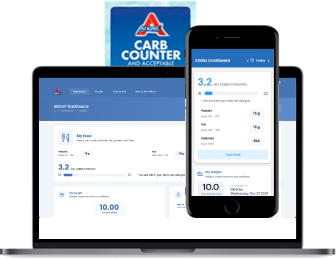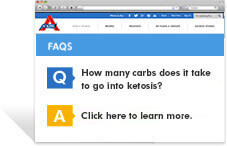How it works > Atkins 20 > Phase 3
Atkins 20
Atkins 20®, Phase 3: Maintaining Your Weight After Dieting
You’re probably now just 10 pounds from your goal weight, which you’ll achieve in Phase 3. This phase is designed for fine-tuning your low carb diet so you can eventually focus on maintaining your weight loss. In Phase 3, you will gradually see how much you can raise your daily net carb intake while exploring the final three rungs of the Carb Ladder.
Phase 3 will last until you have lost your target amount of weight and have kept it off for a full month. Waiting a month ensures that you have adjusted to the plan and will be able to smoothly transition into Phase 4.
We like to call this phase a “dress rehearsal for Lifetime Maintenance,” which includes both trimming your final excess pounds and continuing to explore your personal carb balance. You’ll also find your tolerance for carb intake by gradually increasing the amount of net carbs and paying close attention to your body. If you stop losing weight, you may have found your net carb tolerance. In order to find out, you’ll reduce your daily net carbs by 10 grams for at least a week. If your weight loss resumes, start gradually increasing carbs in 5 gram increments. This will reveal if you’ve found your tolerance or were simply in a plateau.
The goal of Phase 3 is to fully prepare you for your new healthy lifestyle. This means finding your optimum diet by increasing your daily net carb intake in 5-10 gram increments. By Phase 4, you could be consuming anywhere from 80 to 100 grams of net carbs daily. Most importantly, expanding your diet as you continue weight loss will help you understand how your body responds to different ingredients. You’ll do this by introducing foods like starchy vegetables and noting which dishes may be contributing to new cravings or slowed progress.
Stop waiting around and register with Atkins today to kick start your weight loss journey. Take advantage of our low carb recipes, exclusive resources, and free tools to keep your diet on track.
PHASE THREE WEIGHT CONTROL TIPS
Below you’ll discover Low Carb Diet Tips specific to Phase 3. In Phase 3 you are likely close to your goal weight but adding new foods may have caused some frustrations. These are common struggles that many face. Read the diet tips below to help guide you along the next step of your Atkins Journey.
You may experience cravings and uncontrollable hunger as you add back foods you have not eaten in some time. If you suspect that particular foods are sabotaging your progress, eliminate them for several days to see whether things improve before trying to introduce them again,
You may wind up on a plateau. If you’ve already experienced one more plateaus in Phase 2 , you know about that exercise in delayed gratification. If you’ve been spared this frustrating experience to date, make sure that it’s truly a plateau, meaning you’re doing everything correctly. If so, reduce your daily Net Carb intake by 10 grams and wait it out as patiently as you can.
PHASE THREE FACTS: HOW MUCH SHOULD I WEIGH?
If you have questions about Phase 3 of the Atkins diet, you’re in the right place. Below you’ll discover frequently asked questions about weight maintenance and weight goals. From the ideal weight for your body to how many glasses of wine you can have once you’ve reached your goal weight.
There is no single right or wrong weight. Your body type, age, hormonal status, activity level, and genetics all play a role. It’s possible you may be able to achieve a lower weight, but if it’s a struggle to maintain it, you may want to accept that being 5 or even 10 pounds heavier is where your body naturally wants to be. Again, inches count as much as pounds. As you tone your abdominals and other muscles with regular physical activity, your body will appear slimmer. When you come to a point where you’re comfortable with your weight at this time in your life, that’s the place to remain.
In Phase 1, you can have low-carb foods with Net Carb counts of 3 grams per serving; that increases to 6 grams per serving in Phase 2, and to 9 grams in this phase. In Lifetime Maintenance, the number rises to 10 grams or more, assuming your carb tolerance allows.
Yes, if it doesn’t cause weight gain or leave you vulnerable to overeating the snack foods that often accompany alcohol. A general recommendation is a single glass for women and up to two for men, but you know your own tolerance. If you regain weight or lose control, drop back to a single glass or none. Also continue to avoid high-carb beer and mixers made with added sugar.
There are two possible explanations. Either you’re simply eating too many carbs and not burning primarily fat for energy anymore (remember, fat burning suppresses your appetite) or you’ve reintroduced a food or food group that’s spiking your blood sugar. Fruit may be the culprit, particularly if you’re not accompanying it with fat or protein to moderate the impact on your blood sugar. Cut back by 10 grams of Net Carbs a day and eliminate the foods you’re added recently. Then reintroduce them slowly, one by one, to find out which ones are creating cravings.
There are two approaches: satisfy it or eliminate it. Satisfy your sweet tooth with acceptable substitutes, such as an Atkins Endulge bar. If you’re able to have such treats without overdoing them and without causing cravings, fine. If not, eliminate any foods that may be triggering cravings for sweets until you get the situation under control.
PHASE THREE WEIGHT LOSS TRANSITION
The big question is how to know when to transition to Phase 4. If you can answer YES to all the following questions, proceed! Otherwise, hold off until you can.
- Are you at your goal or adjusted goal weight?
- Has your weight remained constant for the last four weeks?
- Are cravings and undue hunger no longer a problem?
ATKINS 20®, PHASE 3 LIST OF LOW CARB FOODS FOR WEIGHT LOSS
In Phase 3 you should be slowly adding food items to your daily net carb count to maintain your weight or continue towards reaching your weight goals. In this phase, you can add small amounts of starchy vegetables, fruits and grains. Be cognizant of how this affects your body and scale back if necessary.
Use the list of acceptable low carb foods for Phase 3 below to guide your eating decisions. Paying attention to serving size is very important to ensure you are not overconsuming calories. Visit our 1,600+ low carb recipes for ideas on how to use these ingredients.
Net Carbs
New Serving Size
2.5
1/2 cup
Coconut, fresh, shredded
4.5
1 fruit
Figs, fresh
5.3
1/4 cup
Cherries
5.5
1/2 cup
Watermelon, cubes
6.4
1/4 cup
Pomegranate seeds
6.6
1/2 cup
Papaya, pieces
6.6
1 fruit
Plum, medium
7.4
1/2 cup
Guava
7.9
1/2 fruit
Apple
7.6
1 fruit
Clementine
8.1
1 fruit
Kiwi
8.9
1/2 fruit
Grapefruit (red)
9.6
3 fruit
Apricot, medium
9.7
1/2 cup
Pineapple, fresh, chunks
10.5
1 fruit
Peach, small
11.1
1/2 cup
Mango
13
1/2 cup
Grapes (red)
14.5
1 fruit
Orange, navel
15.8
3 fruit
Dates, fresh
20.4
1 fruit
Banana, small
21
1 fruit
Pear, medium
Net Carbs
New Serving Size
1.6
2 TBSP
Wheat bran (raw)
4.9
2 TBSP
Wheat germ
6
2 TBSP
Oat bran (raw)
8.6
1/4 cup
Quinoa (cooked)
10
1 slice
Whole wheat bread
11.5
1/4 cup
Oatmeal (dry, steel cut)
12.5
2 TBSP
Polenta (dry)
15.2
1/2 cup
Grits (cooked)
16.6
1/2 cup
Whole wheat pasta (cooked)
19
1/3 cup
Oatmeal (dry, rolled)
19.2
1/2 cup
Barley (cooked)
19.5
1/2 cup
Millet (cooked)
21.2
1/2 cup
Rice (brown, cooked)
* Be sure to check manufacturer’s food labels for most current NC count. Individual brands may vary.
* All figures reflect if the vegetable, legume, or grain is cooked.
Atkins Newsletter
Thank you for your submission! You have been added to our list!


